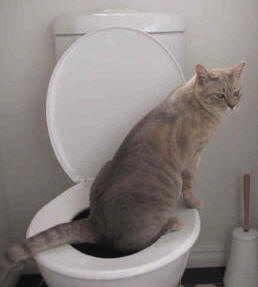Why Flushing Cat Poop Down Your Toilet Can Cause Problems - Tips for Safe Disposal
Why Flushing Cat Poop Down Your Toilet Can Cause Problems - Tips for Safe Disposal
Blog Article
What're your ideas about Don’t flush cat feces down the toilet?

Introduction
As feline owners, it's important to bear in mind exactly how we take care of our feline friends' waste. While it might appear practical to flush cat poop down the commode, this technique can have damaging repercussions for both the environment and human wellness.
Alternatives to Flushing
The good news is, there are much safer and extra accountable methods to get rid of pet cat poop. Take into consideration the adhering to options:
1. Scoop and Dispose in Trash
One of the most usual technique of throwing away feline poop is to scoop it right into a naturally degradable bag and throw it in the trash. Make certain to use a specialized clutter scoop and get rid of the waste without delay.
2. Usage Biodegradable Litter
Choose naturally degradable pet cat clutter made from products such as corn or wheat. These litters are environmentally friendly and can be safely dealt with in the trash.
3. Bury in the Yard
If you have a yard, consider hiding pet cat waste in a marked area away from veggie yards and water sources. Be sure to dig deep adequate to stop contamination of groundwater.
4. Set Up a Pet Waste Disposal System
Invest in a pet dog garbage disposal system specifically developed for cat waste. These systems make use of enzymes to break down the waste, decreasing odor and ecological impact.
Wellness Risks
In addition to ecological concerns, flushing pet cat waste can also present health dangers to human beings. Cat feces may consist of Toxoplasma gondii, a bloodsucker that can cause toxoplasmosis-- a possibly extreme illness, especially for expecting ladies and people with weakened immune systems.
Environmental Impact
Flushing pet cat poop presents hazardous microorganisms and bloodsuckers right into the water supply, posturing a substantial risk to aquatic ecosystems. These impurities can adversely impact marine life and concession water high quality.
Conclusion
Responsible animal possession extends beyond offering food and sanctuary-- it additionally involves correct waste administration. By avoiding flushing feline poop down the toilet and selecting alternative disposal techniques, we can minimize our environmental impact and protect human health and wellness.
Why You Should Never Flush Cat Poop Down the Toilet
A rose by any other name might smell as sweet, but not all poop is created equal. Toilets, and our sewage systems, are designed for human excrement, not animal waste. It might seem like it couldn’t hurt to toss cat feces into the loo, but it’s not a good idea to flush cat poop in the toilet.
First and foremost, assuming your cat uses a litter box, any waste is going to have litter on it. And even the smallest amount of litter can wreak havoc on plumbing.
Over time, small amounts build up, filling up your septic system. Most litter sold today is clumping; it is made from a type of clay that hardens when it gets wet. Ever tried to scrape old clumps from the bottom of a litter box? You know just how cement-hard it can get!
Now imagine just a small clump of that stuck in your pipes. A simple de-clogger like Drano isn’t going to cut it. And that means it’s going to cost you big time to fix it.
Parasitic Contamination
Believe it or not, your healthy kitty may be harboring a nasty parasite. Only cats excrete Toxoplasma in their feces. Yet it rarely causes serious health issues in the cats that are infected. Most people will be fine too if infected. Only pregnant women and people with compromised immune systems are at risk. (If you’ve ever heard how women who are expecting are excused from litter cleaning duty, Toxoplasma is why.)
But other animals may have a problem if infected with the parasite. And human water treatment systems aren’t designed to handle it. As a result, the systems don’t remove the parasite before discharging wastewater into local waterways. Fish, shellfish, and other marine life — otters in particular — are susceptible to toxoplasma. If exposed, most will end up with brain damage and many will die.
Depending on the species of fish, they may end up on someone’s fish hook and, ultimately on someone’s dinner plate. If that someone has a chronic illness, they’re at risk.
Skip the Toilet Training
We know there are folks out there who like to toilet train their cats. And we give them props, it takes a lot of work. But thanks to the toxoplasma, it’s not a good idea.

As a person who reads about How to Dispose of Cat Poop and Litter Without Plastic Bags, I thought sharing that piece of content was beneficial. Feel free to take the opportunity to distribute this entry if you liked it. Thank you for taking the time to read it.
Book Services Report this page